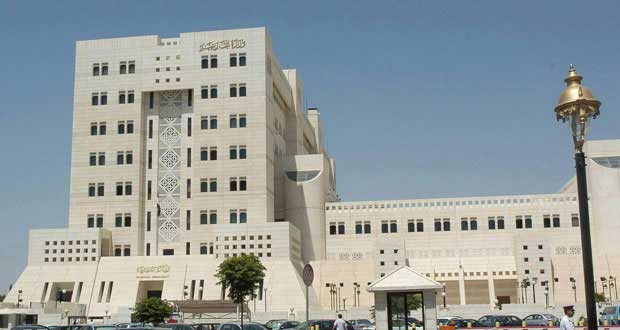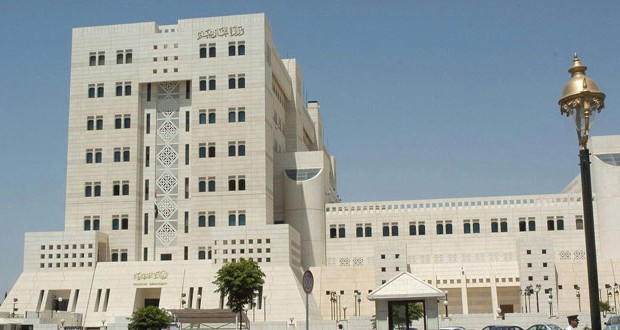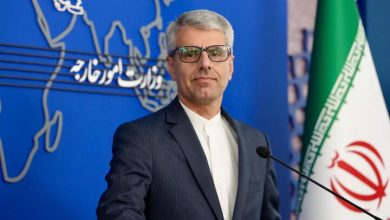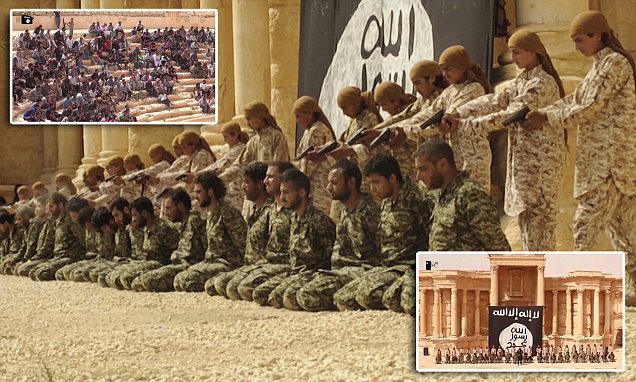Syria reiterates commitment to Agreement on Disengagement, demands ending the Israeli occupation of the Golan

The Foreign and Expatriates Ministry of Syria sent two identical letters to the UN Secretary General and the Security Council Chairman on the stance of the Syrian government regarding the Secretary General’s latest report on the United Nations Disengagement Observer Force ( UNDOF), which monitors a disengagement accord established in 1974 between Syria and the Israeli enemy which occupies the Syrian Golan.
In the letters, the Ministry said the Syrian government reiterates its commitment to its obligations under the Agreement on Disengagement.
This commitment, the letters said, was manifested through the Syrian government’s respect of the UNDOF mandate and it providing all the necessary facilitations to the UN force as well as its solid cooperation and full coordination with each of the peacekeeping operations command and the UNDOF command over more than four decades of the Israeli occupation of the Golan.
While stressing this commitment, the Foreign Ministry affirmed that “the occupied Syrian Golan is an inseparable part of the territories of the Syrian Arab Republic.”
Per contra, the letters added, “Israel proceeds with its repeated violations of the 1974 disengagement agreement, the UN Charter, and the Security Council resolutions, a fact that was confirmed in the UN Secretary General’s latest report.”
“Even the UN forces themselves were not spared from these violations,” the Ministry said, noting that the Israeli violations were documented in the aforementioned report under Paragraph 13.
Citing some of those violations committed by Israel, the Ministry referred to an act of aggression carried out on June 2, 2014 in which the Israeli enemy “fired a number of shells that fell near the headquarters of the UN forces command in Camp Faouar, triggering a state of panic and fear among the UN personnel.”
“Israel went beyond that to launch another aggression on June 23, 2014 which the report spoke of under Paragraph 14 referring to some shells landing in Camp Faouar,” the Ministry added, pointing out that this aggression claimed the lives of 9 Syrians and wounded nine others.
The Foreign Ministry went on saying that those Israeli attacks were coupled with “a direct Israeli involvement in supporting the armed terrorist groups.”
Providing a sound evidence of this involvement, the Ministry cited the UN Secretary General’s report as literally stressing in Paragraph 17 that “throughout the reporting period, UNDOF frequently observed armed members of the opposition interacting with the IDF across the ceasefire line in the vicinity of United Nations position 85.”
The Ministry stressed that Israel’s help and support for terrorists from Jabhat al-Nusra and other terrorist organizations in terms of logistics and intelligence “do not only constitute a breach of the 1974 disengagement agreement, but also pose a danger to the regional security and peace as well as the safety and security of the UN personnel.”
This danger did in fact materialize on the ground, as 43 Fijian UN personnel were kidnapped by what the UN recently described as “armed elements” on August 28. Jabhat al-Nusra, which is designated as a terrorist organization by the Security Council, claimed responsibility for the abduction. Clashes also broke out between Filipino troops and the terrorist groups.
Early last year, a number of Filipino UN personnel serving in the UNDOF were also kidnapped by armed terrorist groups in two separate incidents.
Out of its keenness to remain committed to its obligations, “Syria is showing absolute self-restraint in the process of confronting the acts carried out by the armed terrorist groups in the area where the UNDOF operates, mindful of the nature of the area and the standing obligations,” the Ministry said in its letters.
It made it clear that “Syria reiterates that what the Syrian law enforcement forces are doing comes in the framework of handling an arising situation prompted by extraordinary and accidental circumstances represented in terrorist elements practicing terrorist activities in the disengagement area.”
“This is the minimum duty of the Syrian government in response to the demands and calls of the residents of this area who are being subjected to terrorist acts, which don’t target them only but the UN force and personnel as well,” the Ministry reaffirmed.
It reiterated that those terrorist acts are being committed “with direct help from the Israeli occupation forces and the intelligence services of Arab, regional, and world countries that have become known for everyone.”
In its letters, the Ministry referred to the Syrian government’s strong condemnation of the recent abduction of UN peacekeepers by armed terrorist organizations, including Jabhat al-Nusra, and its demand of their immediate release.
As the Ministry reminded that Syria held the terrorist organizations fully accountable for the safety of the abducted UN personnel, it stressed that Syria did not and neither will spare any effort to the effect of protecting the safety and security of the members of the UN forces operating in the Golan.
The Ministry blamed the UN for what is currently happening in the disengagement area, which it said “came as an inevitable consequence of the UN’s disregard of all the documented information which the Syrian government frequently provided it with on the danger of the spread of terrorist organizations in the disengagement area.”
On the other hand, the Ministry also slammed the UN for overlooking the direct support which those terrorist organizations have been receiving from Israel and some other countries.
“The lack of a reaction by the UN has emboldened the terrorist organizations to go on with their terrorist acts, the thing which recently led up to Jabhat al-Nusra kidnapping the Fijian peacekeepers and imposing a siege on members of the Filipino battalion and threatening to kill them if the demands of those terrorist groups were not met,” the Ministry said.
The Ministry also lambasted the UN General Secretariat for criticizing the presence of the Syrian law enforcement forces, “without which and the military measures they had taken, the life of the Filipino peacekeepers would have been endangered.”
“Instead of the censure, we expected the UN General Secretariat to follow in the footsteps of the Filipino authorities and thank the Syrian government for the efforts it exerted and which resulted in releasing of the Filipino peacekeepers,” the Ministry said.
In reaffirmation of a statement it issued on September 15, the Ministry stressed that the cases of abduction of the Filipino and Fijian UN personnel in early 2013 and recently in 2014 were carried out in collusion with Qatar which “has ties with Jabhat al-Nusra in terms of funding and arming the terrorist organization that have become known to the UN and the international community.”
The Ministry demanded that the UN, and the Security Council in particular, take action to halt the Qatari practices which contravene international law and the Council’s resolutions on counterterrorism, and not stand idly by similar to what it did when it was requested by the Syrian government to investigate information which the latter provided on the involvement of the Qatari intelligence in the abduction of Filipino personnel a year ago.
The UN is also called upon to take immediate measures against the parties and countries which are supporting the terrorist organizations, the Ministry added.
In its letters, the Foreign Ministry expressed Syria’s “regret that the UN General Secretariat ignored in its report the terrorist nature of the terrorist organizations which are designated as such by the Security Council, including Jabhat al-Nusra and Jabhat Ahrar al-Sham, also known as the Islamic Front,” both of which are offshoots of Al Qaeda.
The Ministry cited the acknowledgment by the UN report of the terrorist acts committed by those organizations, quoting Paragraph 42 of the report as saying that “The activities of several armed elements, including the al-Nusra Front, in the UNDOF area of operation since late August, and the direct confrontations with United Nations personnel, forced UNDOF to vacate all but one of its positions in the southern area of separation.”
The Ministry went on saying that the UN General Secretariat’s continuation to classify these terrorist organizations as “armed opposition”, “armed groups of the opposition” or groups of “rebels” contravenes with the Security Council’s statement issued on August 28 on the abduction of UNDOF personnel.
“This constitutes a dangerous violation by the General Secretariat of the Security Council’s relevant resolutions on counterterrorism,” the Ministry added, citing in particular the resolutions 1267, 1373 and 2170.
The Ministry’s letters also voiced the Syrian government’s regret that the UNDOF had handed over the American journalist Peter Theo Curtis, who had been abducted by Jabhat al-Nusra, and transported him into the occupied territories across the disengagement line without coordination with the government.
The Ministry stressed that this act “is considered a transgression of the UNDOF mandate in Syria and a violation of the Syrian sovereignty in terms of illegal trafficking of a person outside the territories.”
This act by the UNDOF, the Ministry added, constitutes “an additional violation” of the UN resolutions on counterterrorism, especially the recently issued resolution no. 2170, in terms of the UNDOF interacting with Jabhat al-Nusra terrorist organization, a thing “which the report seemed to have intentionally overlooked because of its illegality.”
The Ministry referred to the UN Secretary General’s words at the end of his report as he said that the UNDOF will continue working to cope with the emerging situation and demanded that the Security Council continue practicing influence on all the concerned parties to allow the UNDOF to work freely and safely in its area of operation.
It also cited the report as saying that the UNDOF will take additional measures to boost its operations, which is what it has actually started doing by withdrawing from its current positions and consolidating those on the Alpha side of the ceasefire line.
This, the Ministry said, gives an indication that the activity of the UNDOF would be outside the disengagement area, warning that “this could create a vacuum which might encourage the armed terrorist organizations to fill in and use this vacuum to create chaos in the area in implementation of the orders of their backers.”
The Ministry noted that the UNDOF command has moved its headquarters in violation of the Disengagement on Agreement, “whereas it could have been able to perform its role fully through its headquarters in Damascus, in spite of the fact that the Syrian government never refrained from providing support to the UNDOF and its work,” including allowing the entry of equipment to all the battalions serving in it.
The Ministry concluded its letters by saying that the Syrian government stresses the importance of the UNDOF continue its mandate in the framework of the Security Council’s resolutions and the disengagement agreement.
While pledging to continue providing support to the UN force, the Ministry said that the Syrian government reiterates the need for tackling the main reason for the UNDOF’s presence in the area in the first place; which is the continued Israeli occupation of the Syrian Golan.
“Therefore, the Security Council is called upon to work immediately to end the Israeli occupation” in compliance with the relevant resolutions, particularly resolution no. 497 which provides that Israel fully withdraw from the Golan to the line of June 4, 1967.





